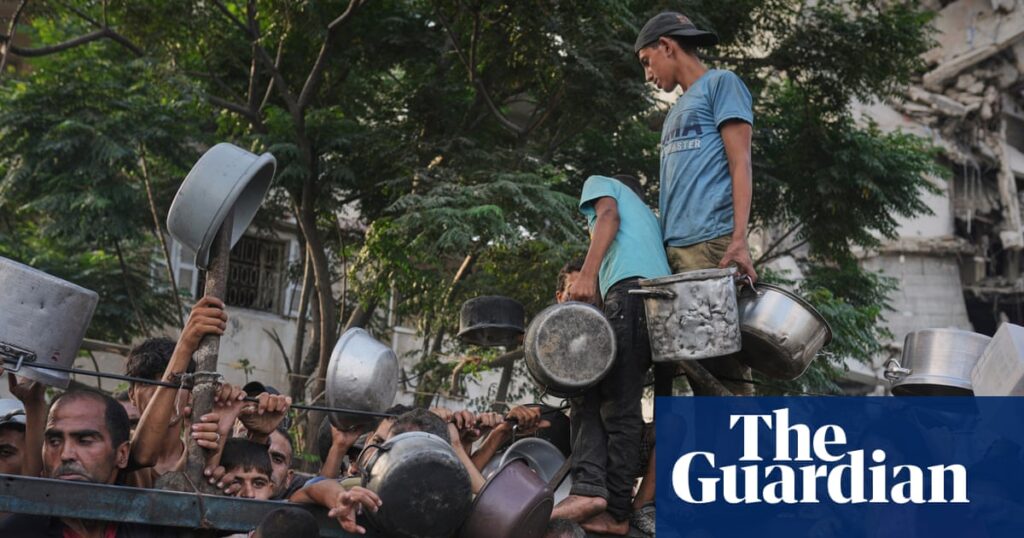The declaration on Friday of widespread famine in Gaza by the Integrated Food Security Phase Classification (IPC) should mark a turning point in the war. The IPC, which represents a fastidious survey of available data, is regarded as the international gold standard in nutritional crises.
Long-criticised by humanitarians in other emergencies for its overabundance of caution, the IPC’s declaration of Level 5 – “catastrophic” hunger – in Gaza is a significant moment. Famine, under the IPC’s exacting criteria, requires three critical thresholds to be passed: extreme food deprivation, acute malnutrition and starvation-related deaths, all of which are now visible in Gaza.
A quarter of all Palestinians in Gaza are starving – more than 500,000 people – with that number expected to rise to more than 640,000 within six weeks.
A mark of the IPC’s thoroughness is that despite the very strong suspicion that famine conditions exist in the far north of Gaza, it has not declared famine there because of a shortage of available reliable data.
Inevitably, Israel has called foul, accusing the IPC of being manipulated by Hamas and claiming that it is providing sufficient food to Gaza.
That lie, however, is challenged not just by the IPC’s ruling but by the accumulation of all available evidence coming out of Gaza. Aid agencies large and small – including Médecins Sans Frontières’ clinics – have been collecting their own data of growing levels of acute malnutrition. Palestinian doctors, journalists and ordinary individuals have told their own stories of going without food for days, of dramatic weight loss and exhaustion.
Those most vulnerable – the very young and very old, and those with pre-existing medical conditions – have begun dying as one would expect to see in an unfolding famine.
Israel’s response has not been humanitarian. Its spokespeople and proxies have laboured to minimise the deaths, claiming those dying were dying anyway of other causes.
Blocking foreign media from accessing Gaza to report independently, Israel has instead ferried in sympathetic social media “influencers” to Gaza to amplify its denials: that it is Hamas’s fault or the fault of the UN, whose main aid agency for Palestinians, Unrwa, Israel has banned from operating in Israel.
As aid agencies complained in a joint letter earlier this month – accusing Israel of “weaponising” aid – new Israeli registration rules have hampered their ability to operate.
Permissions for convoys either do not come, or are erratic or insufficient. Instead, Israel has pointed to its reliance on the private Gaza Humanitarian Foundation at whose sites hundreds of aid seekers have been massacred by Israeli gunfire.
What is most damning, however, is that the outbreak of full famine as described by the IPC and UN agencies has been fully avoidable.
Amid growing warnings over recent weeks and months of the precariousness of nutrition in Gaza, Israel could have reversed course at any point to admit sufficient aid and create a credible mechanism for its safe and timely distribution. As the military occupying force in 75% of the Gaza Strip it has been under a legal obligation under international law throughout this period to ensure this distribution.
As the Food and Agriculture Organization, Unicef, the World Food Programme and the World Health Organization said in a joint statement on Friday, they have “collectively and consistently highlighted the extreme urgency for an immediate and full-scale humanitarian response, given the escalating hunger-related deaths, rapidly worsening levels of acute malnutrition and plummeting levels of food consumption”.
The UN secretary general, António Guterres, also has been clear. The Gaza famine is a “man-made disaster, a moral indictment and a failure of humanity itself” he said, calling for an immediate ceasefire, the release of all hostages still held by Hamas and unfettered humanitarian access.
“People are starving. Children are dying. And those with the duty to act are failing. We cannot allow this situation to continue with impunity.”
Instead of agreeing to a ceasefire and allowing an appropriate emergency response, Israel is threatening a large-scale new offensive precisely where the famine is centred in Gaza City, which would forcibly displace once again up to 1 million already desperate, hungry and exhausted Palestinians with no evidence that Israel has made meaningful preparations to sustain such a huge movement of people.
As David Miliband, the president and chief executive of the International Rescue Committee, said: “The IPC’s confirmation that all famine thresholds have been surpassed in Gaza City is a damning indictment of the failure to protect civilians and uphold humanitarian law. The warning signs have been flashing red for months. The IRC and others have called repeatedly for urgent action.
“The IPC’s findings must be a wake-up call for the international community. Without immediate, unhindered humanitarian access and a ceasefire, more lives will be lost to starvation and disease. This is not a natural disaster, it is a man-made catastrophe, unfolding in full view of the world and entirely preventable.”
The implication was made clear by the UN’s human rights agency: that the famine was a direct result of Israel’s actions. And because of that may amount to a war crime.

